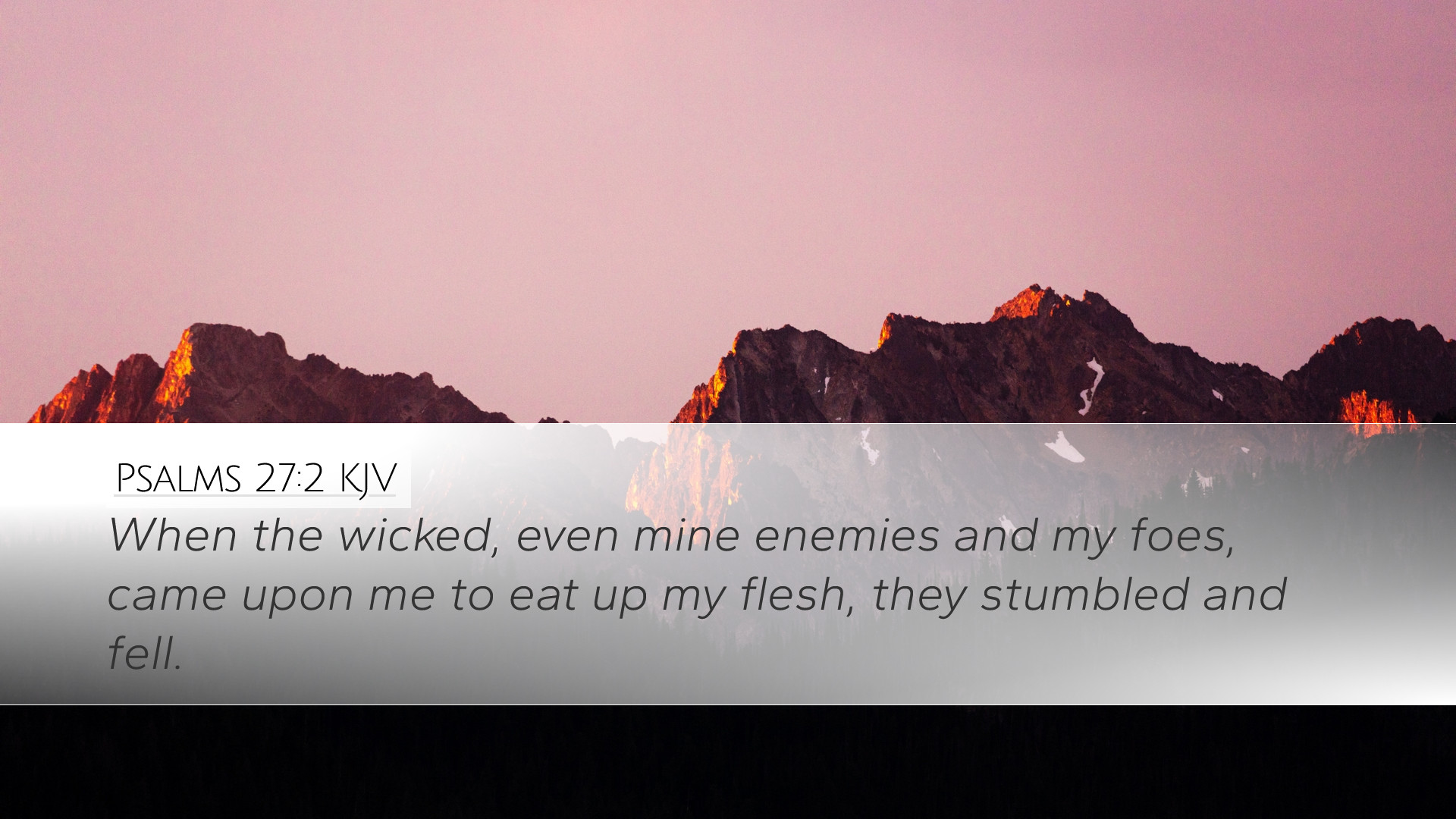Psalms 27:2 Commentary
Psalms 27:2 states: "When the wicked, even mine enemies and my foes, came upon me to eat up my flesh, they stumbled and fell." This verse illustrates a profound truth concerning divine protection and the overwhelming strength of God in the face of adversity. In the context of this Psalm, David expresses his confidence in God amidst perilous circumstances.
Context and Background
The Book of Psalms is a collection of lyrical poems that serve a variety of functions in the spiritual life of God’s people. Psalm 27 is attributed to David, who, while experiencing opposition, confidence, and dependence on God, exhibits a deep relationship with the Almighty.
David’s Enemies
The term wicked signifies those who reject God and oppose His righteous cause. David’s reference to "enemies" aligns with his experiences as a fugitive, pursued by Saul and other adversaries. Matthew Henry outlines how such opposition can come in various forms, from personal betrayals to broader societal threats.
Spiritual Warfare
Adam Clarke highlights that this verse not only depicts physical enemies but also symbolically represents spiritual foes that every believer faces. These foes may include sin, doubt, and fear, which, when left unchecked, can consume and overwhelm.
Divine Protection
The second part of the verse, "they stumbled and fell," suggests a powerful assurance in God’s protective presence.
-
Matthew Henry: His commentary emphasizes that God's hand is against those who plot evil against His servants. When David speaks of their stumbling and falling, it denotes God's justice executing judgement upon those who rise against His chosen.
-
Albert Barnes: He asserts that this is not just a physical stumbling but rather a spiritual failure of those who oppose the righteous. Their plans are thwarted, and their intentions come to nothing in the face of God's sovereignty.
-
Adam Clarke: Clarke elaborates on the assurance given to believers that God will not allow evil to prevail over them. The enemies of the faithful may come with intent to destroy, but God provides the ultimate safety.
Theological Implications
This verse presents profound theological truths regarding the nature of God and His relationship with humanity. David's trust in God illustrates the fundamental principle of faith amidst fears and trials. This reliance is a recurring theme throughout the Psalms and is echoed in the New Testament.
Faith Over Fear
The bridge between fear and faith is vital in a believer's life. Clarke develops the notion that while enemies are fierce and situations daunting, the believer’s trust in God transforms their perspective. Rather than succumbing to fear, they exude confidence in divine help.
Hope in Adversity
In a world where adversity is inevitable, the teachings of this verse bring hope. Henry furnishes the understanding that, while opposition may seem overwhelming, the ultimate outcome is secured in God’s omnipotent hand.
Practical Applications for Today
For pastors, students, theologians, and Bible scholars, the lessons of Psalm 27:2 can translate into vital life principles.
-
Relying on God: In our struggles, the reminder to rely on God’s strength is critical. Every challenge becomes an opportunity to witness His power working through us.
-
Client of God's Justice: Seeking justice through divine means rather than human actions underscores the faith a believer should manifest.
-
Encouragement for the Weary: Sharing the message of God's protection can bolster the faith of those undergoing trials.
Conclusion
Psalm 27:2 encapsulates the essence of trusting God amidst the trials of life. The insights provided from the commentaries encourage a deep reflection on God’s protective nature and love. Believers today can find solace in the promise that enemies may come, but with God on their side, victory is assured.


